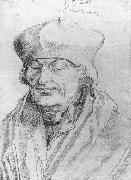
Öl auf dem Segeltuch,das echte Aroma von alten Meistern
|
Albrecht Durer
|
|||
|
|
|||

|
|||
Portrait of Erasmus
Gemälde IDENTIFIZIERUNG:: 63597 new21/Albrecht Durer-593798.jpg 1520 Charcoal on paper, 37 x 27 cm Mus?e du Louvre, Paris In Brussels D?rer met Erasmus, the humanist scholar, and sketched his portrait which six years later he would use as the basis for an engraving. Born in Rotterdam in 1469, Desiderius Erasmus was the greatest European scholar of the 16th century. Using the philological methods pioneered by Italian humanists, he helped lay the groundwork for the historical-critical study of the past, especially in his studies of the Greek New Testament and the Church Fathers. His educational writings contributed to the replacement of the older scholastic curriculum by the new humanist emphasis on the classics. By criticizing ecclesiastical abuses, while pointing to a better age in the distant past, he encouraged the growing urge for reform, which found expression both in the Protestant Reformation and in the Catholic Counter-Reformation. Finally, his independent stance in an age of fierce confessional controversy - rejecting both Luther's doctrine of predestination and the powers that were claimed for the papacy - made him a target of suspicion for loyal partisans on both sides and a beacon for those who valued liberty more than orthodoxy.Artist:D?RER, Albrecht Title: Portrait of Erasmus Painted in 1501-1550 , German - - graphics : portrait Siehe Galerie in Schweden |
|||
|
|
|||
|
|
|||
| b.May 21, 1471, Imperial Free City of N??rnberg [Germany] d.April 6, 1528, N??rnberg | |||
| 1520 Charcoal on paper, 37 x 27 cm Mus?e du Louvre, Paris In Brussels D?rer met Erasmus, the humanist scholar, and sketched his portrait which six years later he would use as the basis for an engraving. Born in Rotterdam in 1469, Desiderius Erasmus was the greatest European scholar of the 16th century. Using the philological methods pioneered by Italian humanists, he helped lay the groundwork for the historical-critical study of the past, especially in his studies of the Greek New Testament and the Church Fathers. His educational writings contributed to the replacement of the older scholastic curriculum by the new humanist emphasis on the classics. By criticizing ecclesiastical abuses, while pointing to a better age in the distant past, he encouraged the growing urge for reform, which found expression both in the Protestant Reformation and in the Catholic Counter-Reformation. Finally, his independent stance in an age of fierce confessional controversy - rejecting both Luther's doctrine of predestination and the powers that were claimed for the papacy - made him a target of suspicion for loyal partisans on both sides and a beacon for those who valued liberty more than orthodoxy.Artist:D?RER, Albrecht Title: Portrait of Erasmus Painted in 1501-1550 , German - - graphics : portrait | |||
|
|
|||







